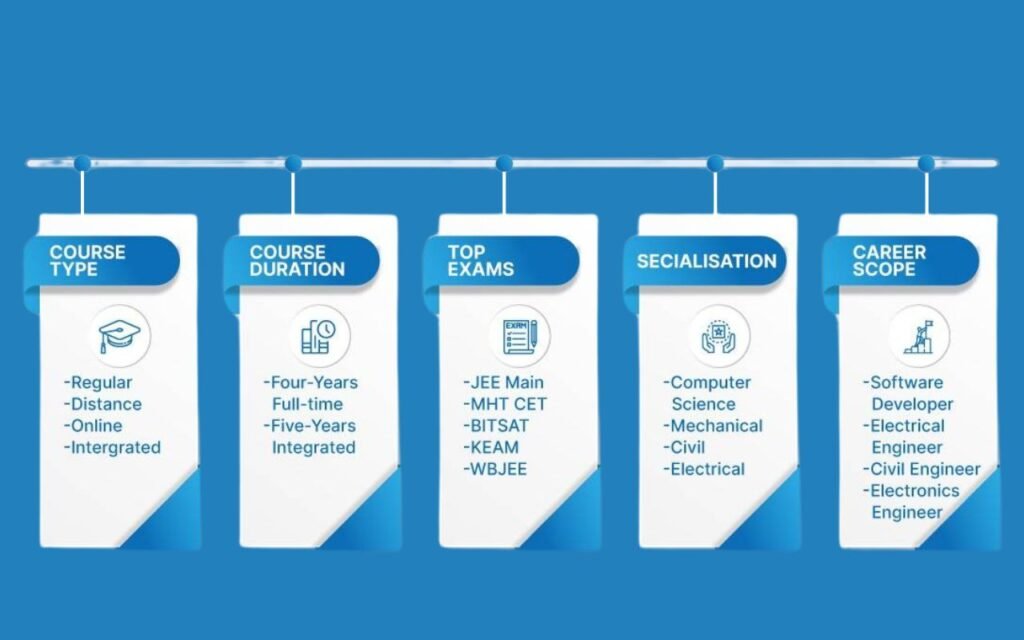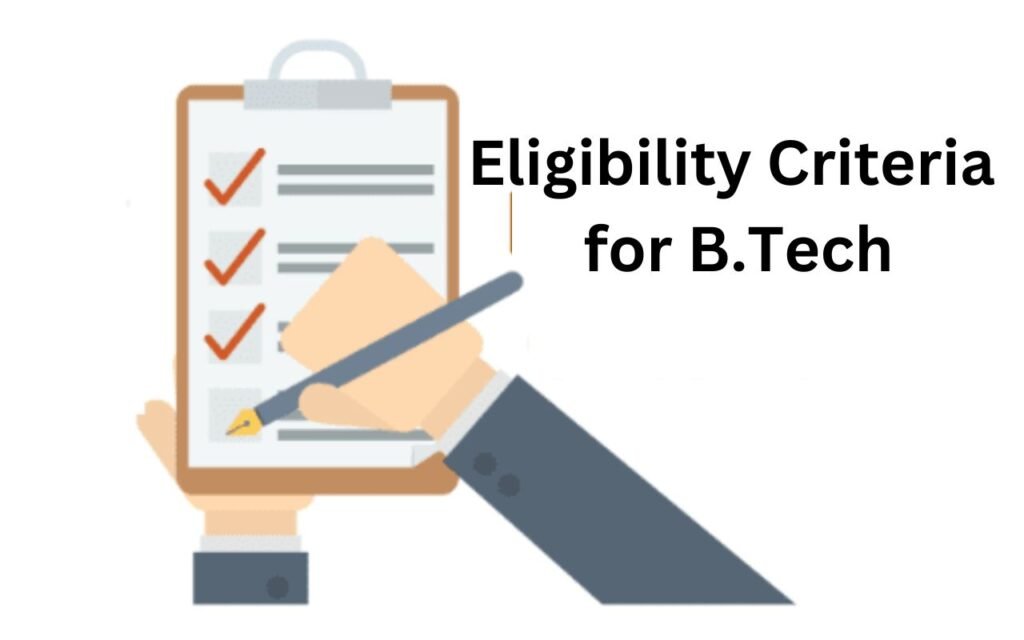Introduction
The world is amid rapid social and technological changes and the needs for well-trained engineers is greater now than ever before. If your set of minds is more towards discovering, exploring, inventing, creating, and innovative then you can pursue a degree in engineering for your higher studies.

Engineering is a very competitive zone. Engineering is an occupation with extremely wide reach. The term ‘engineering’ covers many fields and, by extension, many skills. Engineers are scientists, inventors, designers, builders and great thinkers. They improve the state of the world, amplify human capability and make people’s lives safer and easier.
Thousands of students become engineers every year in India and try to change the world and invent something new. Engineers are completely accountable to change the world. These are the persons who have changed this world beautifully and full of technology. After B.Tech Course They make peoples’ life calmer and comfortable. Engineering is one of the most common career choices in India and according to a report, India produces 1.5 million engineers every year.
Being an engineer is not similar any other program it’s a degree with lots of responsibilities and often helps a nation sustain its international competitiveness. In fact, it’s this field of education that helps maintain our standard of living and ensure robust national security. If you are ready to make a difference not just to your life but your country at large, this program can a good option for you. Engineers are in great demand and every student should try to become an engineer. Engineers form all sectors like computer, mechanical, civil, electrical, electronics etc. Work very hard to solve the problem of the world.
“Science is about knowing, Engineering is about doing — Henry Petroski
Bachelor of technology (btech) is a 4 year engineering course in specializations such as b tech computer science, b tech biotechnology, btech in computer science, b tech it, b tech mechanical engineering and others. The course is designed to develop the technical skills of aspirants who wish the work in the core technology and development sector. Btech is a professional course in the field of engineering.
B.tech comprises both theoretical and practical knowledge. Students are also offered hands-on training in order to learn how different software and hardware in their respective fields are functioned. Apart from the core engineering sectors, b.tech enables candidates to work in the information technology, data analysis, consultancy and management sectors. With good technical skills, bachelor of technology graduates can also apply for jobs in various public sector undertakings (psus) and other jobs in the government sector.
B.Tech Course Highlights
Below is B.Tech Course Highlights Just Go through With it

| Name of the course | B.tech |
| Duration | 4 years |
| List of popular specializations | Civil Engineering | Electrical Engineering | Mechanical Engineering | Computer Science Engineering | Artificial intelligence Engineering | Electronics and Communications Engineering | Chemical Engineering |
| Entrance exams | JEE MAIN | MHT CET | KCET AP EAMCETTS EAMCETKEAM GOA CET WBJEE UPSEE KIITEE BITSAT etc. |
| Minimum eligibility | Class 12th with pcm stream/ pcb for specializations like biotechnology, biomedical engineering |
| Adjacent entry option | Diploma in engineering/ Polytechnic qualifiers can get direct 2nd-year admission in b.tech. |
| Integrated courses | B.tech + M.tech |
| Admission process | Entrance based/ Merit based/ Direct admission |
| Average fee | Rs. 50,000-200,000 per annum |
| Scholarships | Private deemed universities offer scholarships based on the performance in the entrance exam/ class 12th marksState-level scholarship schemes |
| Internships | Recently, aicte directed engineering colleges to offer internships to students, and it is mandatory for all final-year students.Some private colleges and iits, nits offer internships from 2nd-year b.tech only. |
| Career options | Career options differ from one specialization to others. Some of popular career options are – MECHANICAL ENGINEER | ELECTRONICS ENGINEER | COMPUTER ENGINEER | INSTRUMENTATION ENGINEER | MINING ENGINEER | CHEMICAL ENGINEER | CIVIL ENGINEER | ELECTRICAL ENGINEER | COMMUNICATION ENGINEER |
Here is the Eligibility Criteria for B.Tech .Check Below:

- For admissions into b. Tech courses, aspirants should have satisfied the minimum cut-off criteria that are common for all universities.
- Aspirants must have passed the 10+2 exam from a recognized board with physics, chemistry, and mathematics as main subjects.
- They must also have secured a minimum aggregate mark of 60% in the above subjects combined.
- Apart from 10+2 scores, aspirants must appear for common entrance examinations like jee, bitsat, and other university-specific entrance exams for admissions.
- How to get admission for b.tech?
- The admission process for the b.tech course is made in two ways. The whole admission process depends on b.tech eligibility criteria, which states that students should’ve passed high school with a 50% aggregate from the science group. Students are taken in through merit quota based on their scores in national and state-wise entrance exams. The cut-off for these would vary based on the college one chooses, the category they belong to, etc.
- Though the admission process varies from college to college, below mentioned are the steps that one should go through generally to get admission.
How to apply
Most colleges are taking their admission process entirely online. Students are required to visit the official website of the colleges they are interested in and start the application process by giving out their name, phone number, email address, course they are interested in, etc. For offline registration, the students must visit the respective college and fill out the application form by attaching the required documents.
Selection process
Once your application is accepted, based on the college, there might be a final round of group discussion or personal interview before confirmation of admission.
- Reasons why to study b.tech
- A stable career
Engineering is a stable and reliable career choice as the world is always going to need well-trained, skilled, and highly qualified engineers in various fields. The automobile industry, the it sector, and even the finance sector are highly dependent on various types of engineers to run successful enterprises. So if you take up engineering from a leading Indian college which provides the right training and industry exposure then you will have a stable career which is also very lucrative in nature.
Worldwide Recognized Qualifications
Engineering is a global career so pursuing a b.tech engineering degree is a good idea as it will open up a world of opportunities for you.
Most top colleges in India that offer engineering degrees have collaborations with international educational institutions and businesses which help their students receive global exposure through student exchange programs and international internships.
B.tech engineering is a valuable degree and with a few years of work experience you can find a challenging job anywhere in the world.
A Creative & Futuristic Career
As an engineer you will have to be inventive/ creative in your thought process as engineers are the innovators and problem solvers of the world. If you are someone who likes challenges and wants to work in a field that is more skill-oriented, then a career in engineering is the right choice for you.
Engineers are expected to find solutions to complex problems, design newer products and tech, and also innovate on existing products to meet customer demands and needs. It is a hands-on job that demands hands-on skills and deep knowledge of the field.
Various Specializations
Engineering is a enormous field and there are many specialisations you can choose from, depending on your interests and aptitude.
B.tech admissions in 2022 are currently open for aerospace engineering, civil engineering, mechanical engineering, electrical and electronics engineering, and even for specializations in the computer engineering domain such as artificial intelligence, machine learning, cloud technology, cyber security, robotic process automation, and cloud computing. All of these specializations are very innovative with a lot of scope so you can choose the one which suits your career goals best.
Massive Scope for Further Education
Since b.tech engineering is an undergraduate degree, there is a great scope for you to pursue an m.tech degree to further upgrade your skills and knowledge in the domain you have chosen. Most leading companies expect professionals to have competitive qualifications which help them better perform at their job.
If you wish to pursue entrepreneurship, you can back your b.tech degree with an mba degree which can give you the best of both worlds: a background in engineering as well as business management. Whichever path you choose, there are a lot of options for further education after a b.tech degree. This is it in Eligibility Criteria for B.Tech Check More Details Below.
What to do After Engineering?” “What to do After B.Tech?”
Lots of Students and Parents Ask What to Do After Engineering or What to do after B.Tech? If You Question is still Continue For What to do after B.Tech? Check this Now . If you are an engineering student the big question would be “What am I going to do after B.Tech?”. After undergoing the grueling path of JEE and other engineering entrance examinations, you are yet again placed on another crossroad. How many of you wonder which are all the best career options after engineering?

Engineering (b.e., or b.tech.,) is among the most popular graduation courses that students take after completing their school. Choosing the right career can be confusing for many students. The world is full of opportunities. And you might not be aware of most of them.
Everyone has certain aspirations, plans and the selection of what they aspire to be in the future should be according to these emotions.
This is the time when you have to decide where you want to be in the future and how you should go about it. Many Universities in India has compiled some important paths that you can follow after completing your B.Tech. Check these options to know the possibilities of what you can do after your B.Tech. They may put you on the path that is the answer to your question on “What to do after B.Tech”.
Table of contents
- Best career options after engineering
- Campus Placement
- higher studies
- public service undertakings
- Management
- Be your Own Boss – Entrepreneurship
- Become an expert
- Crack the Civil Services Examination
- Look for internships
- Enter the private sector
- Adding some expertise or certification
- Join the Indian armed forces
Get Your answer for What to Do After Engineering or What to do after B.Tech? If You Question is still Continue For What to do After B.tech Must Read these Answers below.
Campus Placement
If you are someone who has no more interest in pursuing further studies, then the campus placements are the answer to your question of what to do after B.Tech. Most good engineering institutes have the facility and do offer good placement opportunities.
Apply for the placement offers available in the campus but more important prepare well for them. There will be no point if you don’t succeed in getting one. Try to apply for jobs that interest you while keeping in mind the field of engineering you are studying so that you can shine in your chosen career.
Campus placements for engineering students are on the rise every year with high packages being offered to candidates with above average performance during their college days.
Higher Studies
One of the most popular career options after engineering is to pursue further studies. This option is only to be taken if you are interested in specializing further. M.Tech or MS by research is the next step to look into with a focus on specialization you wish to take up and excel in. Specialization will provide an edge over others at a later stage especially during job interviews.
If you’re a b.tech student, then you can prepare for the gate exam.
Gate (graduate aptitude test in engineering) is an exam that tests the comprehensive understanding of undergraduate engineering subjects. With an excellent gate score, you can enter prestigious engineering colleges (iits and nits) for M.tech. M.tech is one of the preferred courses after engineering.
You’d get to expand your knowledge and become a more-qualified engineer. If you aren’t interested in the gate exam, you can also prepare for jam. You can enter academics and research in your field of engineering. It is one of the best career options after engineering.
Public Service Undertakings
When we’ve already mentioned the gate exam, it would be wrong to ignore psus. After engineering, you can also choose to enter government-run psus and get a good-paying job.
The competition level for these jobs is quite high. But it’s worth it in the end. Psus check your gate score for recruitment. There are multiple psus, and each of them announces the required gate score for application every year.
They only consider the gate score of that specific year. If you work hard, then you can even get a job in a maharatna psu (bhel, sail, iocl, and others). These jobs offer great pay, security, and give you a respectable position in society. If you are wondering what to do after btech, psus are good options.
Interested in Business and Management i.e., MBA?
If you are wondering what to do after btech, a popular career choice among engineering graduates after engineering is studying management. Studying management can help you get a high-paying job with more responsibility.
To enter this field, you’ll have to get an MBA. MBA is one of the preferred courses after engineering. And for that, you’ll have to give the cat exam (common aptitude test). Your score in the cat exam will determine which institute admits you.
After studying management, you can get managerial roles in different companies. Management is one of the best career options after engineering in India. For those who wish to climb up the corporate ladder fast, this is the best option. Managers are also among the highest-paid professionals in India. You certainly would enjoy pursuing this field.
Be your Own Boss – Entrepreneurship
There was a time when engineers shied away from entrepreneurship. But the successes of many engineer entrepreneurs in recent years have inspired the youth. With the success of many startups, setting up your own business could be a good idea especially if you are someone with such an intent.
This is one option after B.Tech that will let you have the freedom to express your creativity and ideas. You can choose to start your entrepreneurial journey after graduating. To start on this path, you should first identify a prevalent problem and come up with a solution for it. The problem can be in any sector. For example, flipkart removed the hassle of shopping offline and paytm solved the problem of cash scarcity.
Find a problem and solve it. For budding entrepreneurs, there are many resources. You can join a startup incubator, and get a head-start for your company. There are many startup incubators in india. However, its not all sunshine and rainbows on this path.
Starting your own business or Entrepreneurship will require a lot of hard work, a lot of patience and the strength to put up with setbacks. The path will be full of challenges as well as ups and downs that you will need to overcome. But the experience of starting and running a new company is priceless. Moreover, the returns of succeeding as an entrepreneur are fantastic.
Become an expert
Want to get a high-paying job at the start of your career?
Then you should take a course or certification in an in-demand skill. Many companies are looking for engineers who are familiar with the latest technologies, such as artificial intelligence and blockchain.
Jobs in these sectors are better-paying. Moreover, you wouldn’t have to worry about getting a job because high-quality courses also provide placement assistance. And the demand for these skills is tremendously high. Companies are in dire need of professionals’ adept in AI, data science, blockchain, and similar fields.
There are many varieties in this field too. Every skill has different applications. So you have the option of choosing the one which you want to master.
The following are the most popular skills in the current market:
- Blockchain
- Artificial Intelligence and Machine Learning
- Digital Marketing
- Data Science
You can take a course in any one of them and kick-start your career.
Crack the Civil Services Examination:
One of the toughest and most attempted examinations of our country is the Civil Service Exam to go into the administrative side of the government. If you are wondering what to do after engineering, if you aspire to serve the nation and make a dent in the system, you can opt for the civil services as well. It is probably one of the favourite career options after your b.tech of your parents.
Civil services are among the hottest career options. To enter the civil services, you’ll need to crack the upsc civil services exam, which is one of the toughest examinations in the world. Experts recommend preparing for at least a year before applying.
The upsc cse exam is divided into two stages:
- Preliminary examination
- Mains (written exam + interview)
Around 1 million students give this exam every year, and only a few thousand get selected. If you can get a high rank, you can get the prestigious post of IAS, IPS, or IFS, as well.
Look for internships
Often it becomes incredibly challenging to land a full-time job in a reputed company immediately after completing graduation. However, this is the best time to take on internships or apprenticeships. Internships or apprenticeships are excellent means to expose yourself to the real-world working environment.
Although they last for only a few months (3-6 months), they can help build your professional outlook and attain a deeper understanding of work ethics.
Internships are like a short-term training process where you learn the job’s ropes, understand how to conduct yourself in the workplace, and become aware of your key strengths and weaknesses. They present the perfect opportunity for you to learn and grow as a professional. Not for nothing do employers value internships/apprenticeships so much!
If you are wondering what to do after engineering and if you are good at what you do and you have won over your employer, you may end up bagging a full-time job position in the same company.
Sounds enticing, right? It is not an uncommon thing for companies to hire their best interns for full-time roles.
Enter the Private Sector
Still, looking for options before deciding what to do after engineering? While campus placements are an excellent source for getting leads for the private sector, it does no harm to indulge in some research of your own. The best way to start is by registering in reputed job portals like linkedin and indeed to look for jobs relevant to your expertise area and that match your job profile interests.
Since India is a major tech hub in the world today, every year MNCs from all around the globe set up their bases in India. Also, home-grown companies are emerging progressively throughout the major tech and industrial hubs in the country, including NCR, Pune, Gujarat, Bangalore, Chennai, and Hyderabad. Naturally, new job profiles are also emerging, and job vacancies are skyrocketing. This is why the private sector holds tremendous promise for fresh b.tech graduates.
However, landing a job in the private sector comes with its unique challenges. The biggest problem is that the supply of engineering graduates is way more than the demand created by private sector companies. This leads to cut-throat competition in the job market. So, what can you do then?
You can create a solid resume that highlights your core strengths, skills, and expertise areas. Another vital thing to remember while designing a resume is that different job profiles have different requirements. Hence, it is crucial to squeeze your resume according to a particular job profile.
For instance, if you’re applying for the profile of a software engineer, make sure to highlight your mathematical skills, programming skills, and command over various programming languages. If you have any relevant certifications or internships under your sleeve, include them as well. Basically, you need to understand the demands of a job profile and then create your resume around it.
Adding Some Expertise or Certification
If you wish to make engineering your career but want to have an edge over the others without spending a lot of time on studying further, certification or diploma courses are the options for you. There’s no end to learning, especially if you are a curious soul forever willing to acquire knowledge and gain new skills. If you are someone who wishes to upskill before taking on a professional role, certifications are the right way to go.
After completing your graduation, you can enroll in certification courses that are relevant to the field of engineering. Courses such as embedded technology, VLSI, robotics, ethical hacking, protocol testing, machine designing and more are some specialized courses to name a few. Most of these courses are job oriented and aimed at equipping specialized skills to your resume. These short-term courses will add some specialized educational qualifications to your resume and can be one of the answers to your dilemma of what am I going to do after B.Tech.
Join the Indian Armed Forces
Always been a patriotic one? Interested in serving the nation? Take this opportunity to join the Indian Army/Navy/Air Force or any other wing. The Indian armed force has three wings – the Indian army, the Indian air force, and the Indian navy. The Indian army is land-based, whereas the Indian air force and Indian navy are in charge of the air and water bodies, respectively. As a b.tech (engineering) graduate, you can find employment opportunities in all three wings of the Indian armed force, only the standard for joining each is different. For students who are wondering what to do after engineering, joining forces is a good option.
The Indian army is always on the lookout for technically sound professionals who can support the troops on the field. Usually, engineers who join the Indian army are allotted to any of the three branches – corps of engineers, corps of electronics and mechanical engineers, and corps of signals. You can join the army through tgc (technical graduate course) and ssc tech entry schemes.
Similarly, after completing your b.tech (engineering), you can join the technical squad or the ground squad of the Indian air force, depending on your qualifications and skillset. Usually, b.tech graduates can get in through the AFCAT (air force common admission test) entry scheme.
As for the Indian navy, the government has now started recruiting engineers via the snaes (special naval architects entry scheme) entry scheme.
Well, these are the top 11 answers to what to do after B.Tech or What to do after Engineering .These are just some options. There are plenty more if the above doesn’t suit you. Other career paths include
Teaching – Well, its a noble profession and worth the effort. The downside is that there is a lot of competition and a huge amount of effort involved in teaching. To become a professor, one can appear for the UGC NET exam or the CSIR NET one too. To be a school teacher in Government schools, the CTET and state conducted “Teachers Eligibility Tests (TET)” are some exams to be taken.
Event Management – With more destination and theme weddings, birthday parties as the rage, one of the most important jobs come in for the management of such events. While there are no formal recognized courses for these, the best way to go about this is to join an event management company to see the various aspects that go into this.
Design – This is one of the upcoming fields and underrated too. Most technical fields also require designing and some of the design specializations are for engineering students too. If you are someone with an aptitude for drawing and designing, you could opt for this. From the automobile industry to mobile phone manufacturing, design plays an important role. Even some IITs offer these courses. CEED is the exam for this. In addition, there are other institutes which also offer design. some specializations include industrial design, communication design etc. These all are the Answer for What to Do After Engineering or What to do after B.Tech? .
- Make your path
Well, what are you waiting for? Check out which suits you and pick it up. Now you won’t need to wonder what should I do after B.Tech. You have all these options and more. Get going and make your mark!
As you can see, engineers have tons of career options after they graduate. Whether you want to climb the corporate ladder or conduct research, there are ample opportunities everywhere.
The above is a list of some great career options after engineering. We hope it will answer your question “what to do after engineering?”, “what to do after btech?”. You can determine your interest based on your career choice that you would like to opt for after your graduation. For all young minds, wondering what to do after engineering, you need to check the amount of time, the difficulty level, before deciding which path to opt after your graduation.
This is it in B.Tech Course | B.tech Course Highlights | Eligibility Criteria for B.Tech | What to do After Engineering | What to do After B.Tech.
Engineers like to solve problems. If there are no problems handily available, they will create their own problems.”
– Scott Adams
B.Tech Course | Bachelor of Technology | Full Form, Courses List, Fees, Syllabus, Eligibility, Admission ,Career Scope






1 Comment
Pingback: Admission in Law colleges without Entrance Exam - Yashi Digital Education